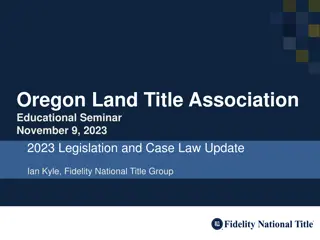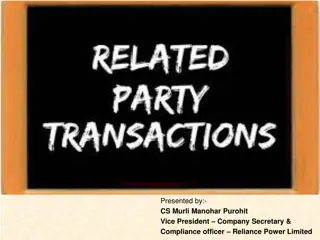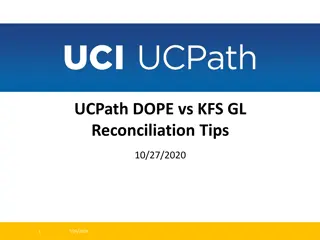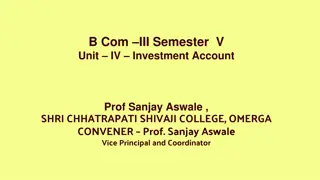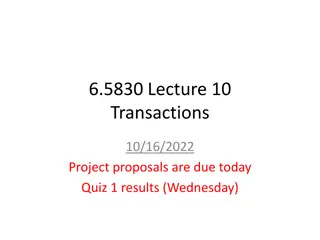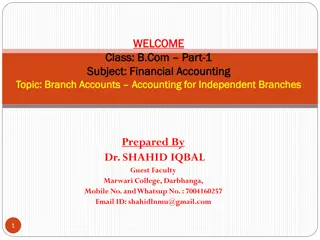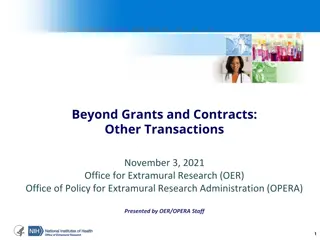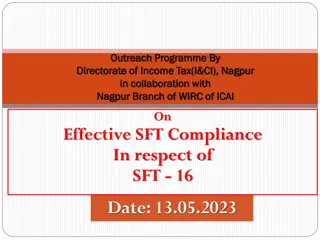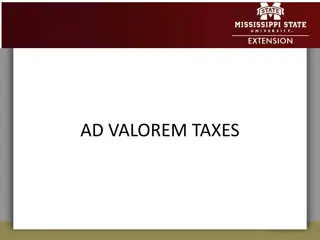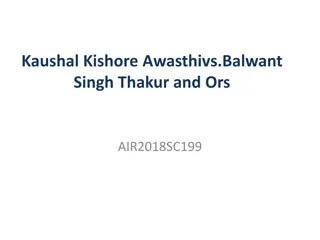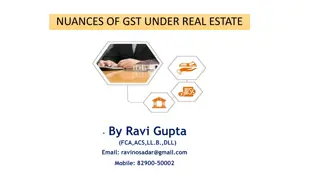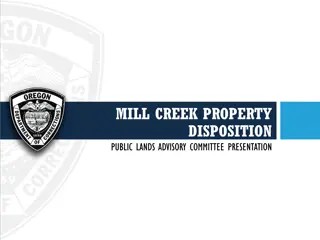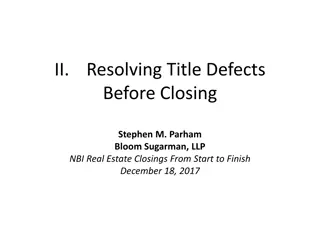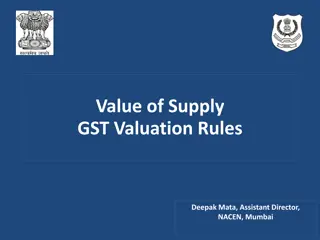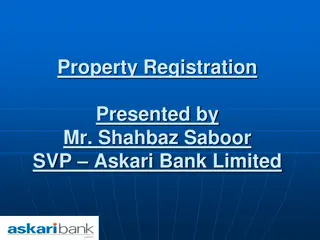Understanding the Concept of Sale in Property Transactions
Sale in property transactions involves the absolute transfer of ownership rights from the seller to the buyer against a price paid or promised. This process, governed by Section 54 of the law, entails the essential elements such as parties involved, subject matter, price, and mode of execution. It differs from other agreements like exchange, hire purchase, and lease in terms of rights and liabilities. The transfer can be executed through a registered instrument for properties above a certain value or through delivery for properties below that threshold. The buyer acquires the complete rights over the property in a sale, marking it as an absolute transfer of ownership.
Download Presentation

Please find below an Image/Link to download the presentation.
The content on the website is provided AS IS for your information and personal use only. It may not be sold, licensed, or shared on other websites without obtaining consent from the author. Download presentation by click this link. If you encounter any issues during the download, it is possible that the publisher has removed the file from their server.
E N D
Presentation Transcript
Points to be discussed Sale as a mode of transfer of ownership. Sale: Meaning and definition, Essentials. Parties to a sale Subject matter of sale Price Mode of executing a sale Registration Difference between sale and exchange Difference between sale and a hire purchase agreement. Difference between sale and agreement to sale Rights and liabilities of buyer and seller
Sale implies an absolute transfer of rights in the property sold. No rights are left in the transferor. The term sale has been defined under section 54 of the Act:
Section 54. Sale Sale is a transfer of ownership in exchange for a price paid or promised or part paid and part promised. Sale how made- Such transfer, in the case of tangible immoveable property of the value of one hundred rupees and upwards, or in the case of a reversion or other intangible thing, can be made only by a registered instrument. In the case of tangible immovable property of a value less than one hundred rupees, such transfer may be made either by a registered instrument or by delivery of property.
Delivery of tangible immoveable property takes place when the seller places the buyer, or such person as he directs, in possession of the property. Contract for sale- A contract for sale of immoveable property is a contract that a sale of such property shall take place on terms settled between the parties. It does not, of itself, create any interest in or charge on such property.
Section 54 defines the term Sale as a transfer of ownership in exchange for a price paid or promised or part paid or part promised. In fact, an owner has three basic rights over his property, right of title, an exclusive right to possess and enjoy the property and an exclusive right to alienate it. In a sale of property, all these rights are conveyed by the owner in favour of the transferee who is called a buyer. The buyer gets totality of rights, therefore it is called absolute transfer. While in a lease, there is a transfer of a right to possess and enjoy the property but the title and a right of alienation remain with the owner.
Similarly in mortgage, what is transferred is a right to cause the property to be sold in the event of non payment of loan by the mortgagor. In a sale, all rights are transferred in favour of the transferee. transaction amounts to sale or not would depend upon the transfer. Whether a substance of the
Therefore, in Vidyadhar v. Mankirao and another JU 1999 (2) SC 183, it was held that in order to constitute a sale, there must a transfer of ownership from one person to another, i.e., transfer interests in the properties possessed by that person, are transferred by him to another person. The transferor does not retain any part of his interest or right in that property or else it would not be a sale. The definition clearly points out that price which is an essential ingredient of the transaction of sale, might have been paid, partly paid and partly promised to be paid. of all rights which and are
Essentials Parties: Seller and buyer Seller must be a person competent to contract and he must have title to the property or authority to transfer it, if it is not his own. The buyer is a person who is not disqualified to be a transferee under section 6(h). A minor is a competent transferee in a transaction of sale. Even a mortgage or a gift can be executed in favour of a minor, but a minor cannot take a lease in his favour because it is to be executed by both the parties. Therefore, a lease deed executed by minor is void. For a buyer, there are three qualifications: financial capacity to pay, willingness to buy. However, an officer performing an official duty in connection with the sale of the property cannot purchase the same. For a seller, personal capacity- means physical, mental and absence of legal disability
Legal disability means an incompetency imposed under a law or a statute. When a person is declared as an insolvent, his property vests in the official receiver, and he is incompetent to transfer the same. Similarly a judgment debtor is no capable to sell the property, that is to be sold in the execution of a decree under the order of the court. Besides, any property cannot be sold when it is under the management of the Court of Wards. However, a minor can be a buyer of property if the consideration is paid in full and there is no future liability pending on him.
Authority to dispose: The transferor should either be the owner of the property or should have an authority to dispose of it. The Karta of a Joint hindu family property is authorised to transfer the property under certain specified circumstances. Similarly, the guardian of the property of a minor is empowered to sell it with the permission of a court and without such permission the sale would be invalid. An agent having a power of attorney to sell the property can also sell it without being the owner of the property. Where the sale was executed after getting a general power of attorney, without obtaining the requisite permission of the court, the sale deed is invalid and would not confer any title on the transferee.
Subject matter: An immoveable property. An immoveable property may be tangible (land, house, tree) or intangible (right to fisheries, right to way etc.) Price: Consideration for sale of property. Price is the essence of contract of sale. It must be something which is of value in the eye of law but it cannot be illusory. Partly paid or promised: General rule is that price has to be paid at the time of execution of conveyance, yet the parties can deviate from this general rule as per their agreement.
Sale deed executed in consideration of nikah? Munna Khan v. Ashrafunnisan Air 1983 All 363. Not a price. AIR 1978 AP 1: The property transferred by a person to concubine cannot be termed as sale. Adulterous intercourse cannot be a substitute for price paid or promised nor can it be valid consideration.
Non payment of price: Important to point out here that non payment of price does not affect the passing of title from seller to purchaser, subject to the condition that sale has been completed by execution and registration of conveyance. The seller may claim through a separate suit for purchasing money. Where a suit has been filed by the purchaser against seller to recover possession, the court purchaser through the same case to pay money to seller, nor can the decree of possession can be passed as conditional on the payment of purchase money. cannot compel the
Therefore it must be clear that the question whether title passes on the basis of execution and registration of a deed or only on payment of consideration- it depends upon the intention of the parties, which can be gathered from the deed. Payment of price is not a sine qua non to the completion of the sale. If the intention is that property should pass on the time of registration, the sale shall be complete when deed is registered- it does not matter whether price has been paid or not. Here the purchaser would be entitled for possession and can recover it by suing.
Difference b/w Sale and Hire Purchase agreement. A sale is different from a hire purchase agreement. A hire purchase agreement may culminate in a sale, but till it does so, there exists a right in favour of the transferor rescind the agreement and take back the possession of his property. In hire purchase property payment through installment is an accepted feature of a hire purchase agreement, the terms of payment of consideration in a sale are purely dependent upon the agreement between the parties.
Difference between Sale and Exchange Sale is transfer of ownership in a property in lieu of consideration while in exchange there is a transfer of ownership exchange for something that is not money. The another distinguishing feature of sale and exchange is that in a sale a right of pre-emption may exist but it cannot exist in case of an exchange. in
Difference b/w sale and agreement to sell Sale means contract plus conveyance. It is a transfer of property also where agreement to sell is a simple agreement. Sale in an executed contract where agreement to sell is an executory contract. Passing of title: Sale effects transfer of ownership while agreement to sell does not create any interest in the subject matter of the contract. transfer =
Difference b/w Contract to Sell and Contract of Sale A Contract to Sell or Contract for Sale is an agreement between a buyer and a seller whereby the seller promises to sell something to the buyer and the buyer promises to buy it. But generally, in this kind of contract, the ownership of the subject matter is not transferred to the buyer upon the signing of the contract. There are usually conditions to be complied with by one or both of the parties. And the transfer of ownership will only happen when those conditions are met. A Contract of Sale is an agreement between a buyer and a seller whereby the seller agrees to give or deliver something to the buyer for a certain price which the buyer agrees to pay. In contracts like this, when the buyer pays and the seller delivers, the transfer of ownership is also done at the same time.
Contract of Sale There is a transfer of ownership Contract for sale There agreement for the sale of property in terms agreed between parties. Does not create any interest in the property. Creates a right in personam Does not require registration. is merely an Conveys a legal title to the buyer. Creates a right in rem Mandates registration where sale is of immovable property of Rs. 100 or more.
Formalities for Effecting sale Section 54 lays down a specific method for the execution of a sale deed with respect to immovable property and completion of sale. It is complete generally by these formalities: writing, executing, attesting and registering sale deed. Sale can be made in 2 ways: Where the value of Tangible Immovable Property is Rs.100 or more than that or in the case of a reversion or other intangible thing, sale can only be made through Registered Instrument. Where the value of Tangible Immovable Property is less than Rs.100 , sale can be made through Delivery of Possession
Registration Sale of tangible immovable property of the value of Rs. 100/- or more can only be made in writing. The deed must be attested and also registered. If by a single document, both movable and immovable properties are transferred, and the value of the immovable property is more than 100/- rupees- such transfer should take place with the help of written, attested and registered document.
Mode of Transfer Delivery of possession Registration of sale deed.
Rights and Liabilities of Seller and Buyer Sec 55
Liabilities of the Seller Duties on the seller before completion of Sale - six duties to be performed before passing of ownership Disclosure of material defects of property. 55(1)(a) Allowing the buyer to examine documents. 55(1)(b) To answer queries of the buyer. 55(1)(c) To execute a proper conveyance in buyer s favour. 55(1)(d) To take care of property and related documents in between the date of contract to sell and actual execution of sale deed. 55(1)(e) To pay public charges due till date of sale. 55(1)(g)
Liabilities of the Seller After completion of Sale To deliver possession 55(1)(f) - The seller is bound to give, on being so required, the buyer, or such person as he directs, such possession of the property as its nature admits. Implied Covenant for Tiltle [S.55 (2)] - The seller shall be deemed to contract with the buyer that the interest which the seller professes to transfer to the buyer subsists and that he has power to transfer the same. To Deliver Title-deeds on Receipt of Price [S. 55 (3)] - Where the whole of the purchase-money has been paid to the seller, he is also bound to deliver to the buyer all documents of title relating to the property which are in the seller's possession or power, unless otherwise specified.
Rights of the Seller SELLER S RIGHT BEFORE SALE - Right to take Rents and Profits [S. 55 (4) (a)] The seller is entitled- to the rents and profits of the property till the ownership thereof passes to the buyer. SELLER S RIGHT AFTER SALE- Charge upon Property for Unpaid price [S. 55 (4) (b)] The seller is entitled- where the ownership of the property has passed to the buyer before payment of the whole of the purchase-money, to a charge upon the property in the hands of the buyer, any transferee without consideration or any transferee with notice of the non-payment, for the amount of the purchase- money, or any part thereof remaining unpaid, and for interest on such amount or part from the date on which possession has been delivered.
Liabilities of Buyer Duties of Buyer before Sale: The buyer bound to disclose, facts which materially increases the value of property, Section 55(5)(a) of the Act provides that, the buyer is bound to disclose to the seller any fact as to the nature or extent of the seller s interest in the property of which the buyer is aware, but of which he has reason to believe that the seller is not aware, and which materially increases the value of such interest Section 55(5) (b).- Buyer is bound to pay the price of property to Seller
Liabilities of Buyer Duties of buyer after Sale : Section 55 (5) (c) - The buyer is bound to bear any loss arising from the destruction, injury or decrease in value of the property not caused by the seller where the ownership of the property has passed to the buyer. Section 55(5) (d) - The buyer is liable to pay the outgoings, e.g., Government dues, rents, revenue or taxes
Rights of Buyer Buyer s right before sale- Section 55(6) (a) - Buyer is entitled to (unless he has improperly declined to accept delivery of property): A charge on the property for the purchase money properly paid by him in anticipation not the delivery. (ii) Interest on such purchase money. The earnest , and cost awarded to him in a suit to compel specific performance of the contract or to obtain a decree for its recession in case he properly declines to accept delivery. Buyer s right after Sale- Section 55 (6) (a) - Buyer is entitled to receive any benefit of any appreciation of the property or increase in its value and to the rents and profits thereof.



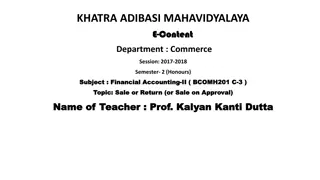

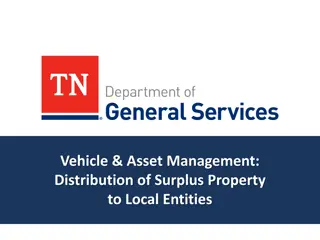
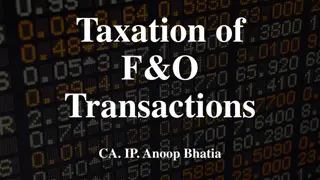
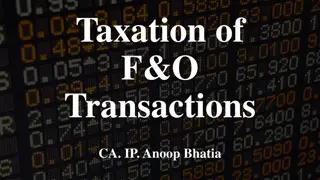


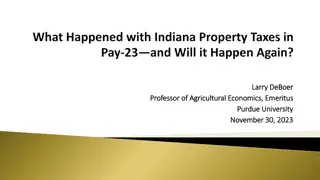
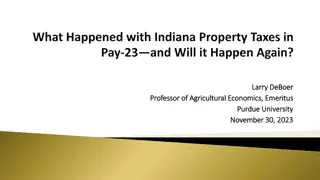
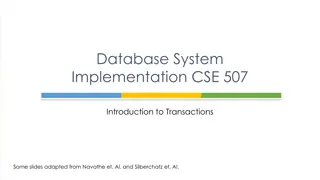
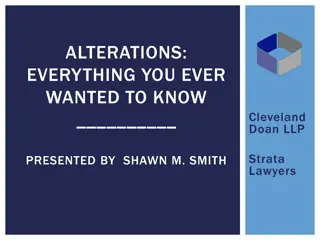

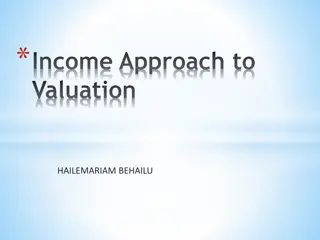
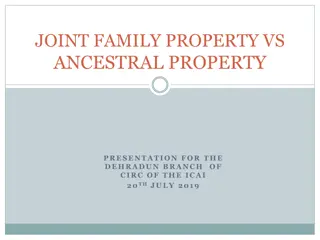
![Property Settlements in Family Law: Case Study of Stamatou & Stamatou [2022] FedCFamC1F 241](/thumb/63303/property-settlements-in-family-law-case-study-of-stamatou-stamatou-2022-fedcfamc1f-241.jpg)

